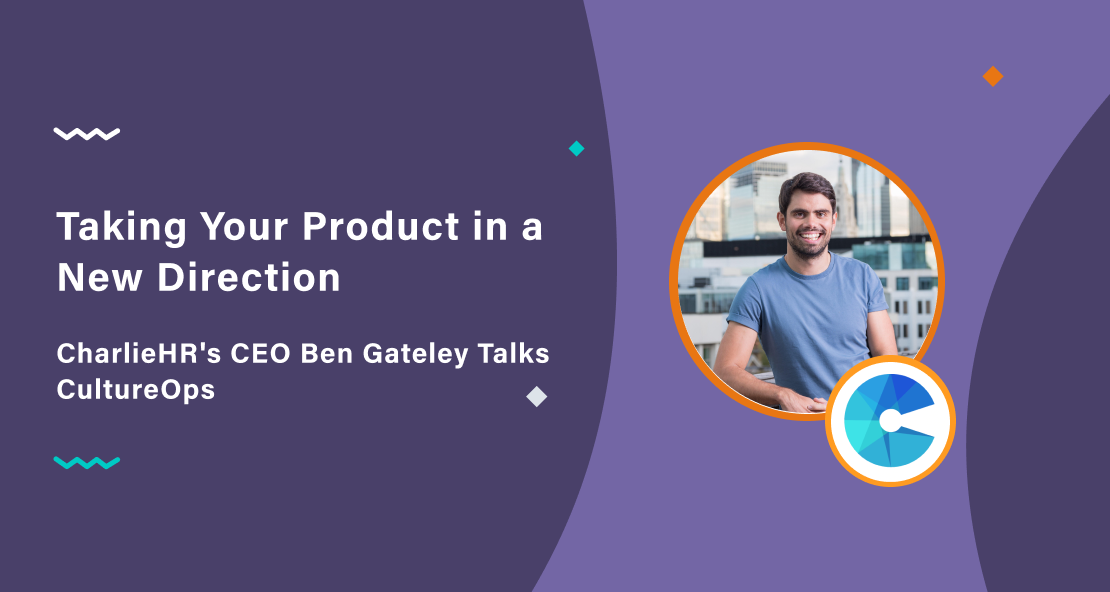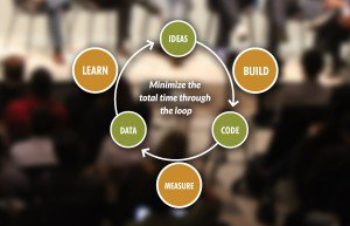Taking Your Product in a New Direction: CharlieHR’s CEO Ben Gateley Talks CultureOps

I’m Ben Gateley, the CEO and one of the Co-Founders of CharlieHR. You’re catching us at an intersection of what we, and our product, does. We’re heading to a world where we help companies craft their company culture. That’s the thing that we’re really passionate about and we build tools and software to help them do that.
Great to speak with you Ben. So can you tell me about the new direction that CharlieHR is heading in?
We’re moving from one category to another. We started out slap bang in the middle of the HRMS market, which is a long-standing software market for HR management systems. The category focuses on admin innovation, helping organizations save time.
Two years ago, we sat down as a business and asked ourselves; how excited are we to build a product that just helps HR teams save time? And the answer was, not hugely. I guess that’s when the shift happened. From thinking about culture as a company’s responsibility, to culture as a strategic tool that can be used to drive a business forward.
So we moved into this space we like to call “CultureOps”. It’s a space where products are used to help organizations optimize their company culture. You’ve caught us right in the middle of this transition.
What opportunity did you see that convinced you to make this shift away from HRMS and into CultureOps?
Culture isn’t something that we’ve ever been good at defining. In the last decade especially, culture has become a fluffy, ambiguous thing. We don’t believe that it has to be that way. Company culture is hard to define, and because it’s hard to define it’s difficult to measure. Because it’s difficult to measure, it’s difficult to prioritize.
We heard from a lot of employees who believed their company culture needed to change. Gen Z is coming out of university and school and a company’s purpose is such a big thing for them. What they want from their jobs is different from what their parents wanted from their jobs.
So we’re seeing that shift from employees, but founders, CEOs and MDs don’t really know what to do about it. They don’t know what levers to pull to improve their company culture. And so defining how companies work on their culture is the first thing that we want to do. And then the second thing that we want to do is use technology to help businesses work on the three levers of great company culture – their people, their processes and their policies.
How are you using technology to help businesses work on those three levers of company culture – people, processes and policies?
You’ve caught us at a really early stage, so as always our technology is a work in progress. What I can talk about is the first process that we want to tackle – feedback. If you want to bring around cultural change in your company, feedback should be top of your list. If you don’t build a process of feedback within an organization, how can you create a culture of constant improvement and development? So firstly, we’re building a tool to help companies improve their feedback cycle.
Your technology is currently mid-shift, but if you can cast your mind back to your first MVP – did you build that in house or outsource it, and why?
One of our first hires was a technical team member and engineer called Chris Butcher, so we built all of our tech in house. I think the in-house versus outsourcing is an interesting question. There are so many ways to skin a cat – there’s no silver bullet. You have to ask yourself what kind of experience you want to have. Do you want to learn about the technical challenges of building a business? If you do, then build it in house. If you don’t care, then out source it. It’s totally up to the experience you want to have as an individual founder.
What did you learn from building your tech in house? And would you do anything differently?
Of course! And if any founder tells you that they wouldn’t, they’re lying. But would I make the same mistakes again? Yes, probably. Because otherwise I wouldn’t have learnt. There’s a huge amount of ego in the startup space, and I don’t think that it’s helpful.
You have to start from a place of expecting to get things wrong – no one has all the answers. It’s also really important to be vulnerable about the stuff that you’re learning and the stuff that you’re getting wrong in front of your team. Because then everyone improves, everyone gets better. Hiding this stuff is of value to no one.
As teams continue to work from home, company culture is waning everywhere. Surely a global lockdown has provided an increased demand for online HR tools?
You’re right. And there’s a new expectation from employees that, if they can do their job from outside of the office, they should have the freedom to do so. The barriers that exist between work and home have disappeared which can be an amazing thing, but also an awful thing.
And so we have a job to do, which is to improve the working experience to limit the negative impact that it has on people’s everyday lives. How do we do that? By helping companies craft great culture.
Although, have you seen a push back from employers? Where after a year of lockdown they want to pull in the reins and regain control?
You use the word control there, but employers never had control. They only had perceived control. When their staff come into the office from nine until five, they perceive that work is getting done because of their staffs’ physical presence. But how many times have we all sat at our desk and scrolled mindlessly through our emails?
My advice would be to let go of control altogether. Instead, focus on alignment. Your job as a business owner is to set a vision, set milestones and set a direction. Your job is to draw the lines on the football pitch or the basketball court that we’re going to play on.
Create a framework where the work gets done and let the amazing people that you’ve spent all this time and money hiring crack on and do great work. I don’t actually think that employers have any less control than they ever did have. It just felt like they had more control.
What advice would you give founders who are working through a similar shift in product focus, like you are at CharlieHR?
You have to have conviction, because it’s really hard to shift from one thing to another. Especially if you’re shifting into something that there isn’t yet a benchmark for yet.
And know that it’s better to spend your time doing something that you believe in, and you’re passionate about. Because nothing’s more valuable than the minutes in the day you spend building this thing. You never get those back.
Of course it’s also about finding the intersection between something that you’re passionate about and an in-coming trend or demand. That’s the sweet spot!
Key takeaways:
- Be vulnerable. If you share your mistakes with each other, you grow faster and more efficiently as a team.
- Shifting your product focus is hard work. You need to be absolutely convinced that it is the right thing to do for your company and your product.
- Reflect on what sort of experience you want to get out of creating your company. This will affect whether you commit to building an in-house technical team or opt to outsource to a technology partner.



